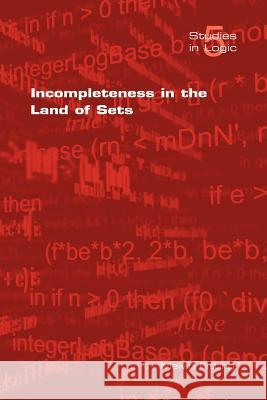Incompleteness in the Land of Sets » książka
Incompleteness in the Land of Sets
ISBN-13: 9781904987345 / Angielski / Miękka / 2007 / 156 str.
Russell's paradox arises when we consider those sets that do not belong to themselves. The collection of such sets cannot constitute a set. Step back a bit. Logical formulas define sets (in a standard model). Formulas, being mathematical objects, can be thought of as sets themselves-mathematics reduces to set theory. Consider those formulas that do not belong to the set they define. The collection of such formulas is not definable by a formula, by the same argument that Russell used. This quickly gives Tarski's result on the undefinability of truth. Variations on the same idea yield the famous results of Godel, Church, Rosser, and Post. This book gives a full presentation of the basic incompleteness and undecidability theorems of mathematical logic in the framework of set theory. Corresponding results for arithmetic follow easily, and are also given. Godel numbering is generally avoided, except when an explicit connection is made between set theory and arithmetic. The book assumes little technical background from the reader. One needs mathematical ability, a general familiarity with formal logic, and an understanding of the completeness theorem, though not its proof. All else is developed and formally proved, from Tarski's Theorem to Godel's Second Incompleteness Theorem. Exercises are scattered throughout."
Russells paradox arises when we consider those sets that do not belong to themselves. The collection of such sets cannot constitute a set. Step back a bit. Logical formulas define sets (in a standard model). Formulas, being mathematical objects, can be thought of as sets themselves-mathematics reduces to set theory. Consider those formulas that do not belong to the set they define. The collection of such formulas is not definable by a formula, by the same argument that Russell used. This quickly gives Tarskis result on the undefinability of truth. Variations on the same idea yield the famous results of Gödel, Church, Rosser, and Post.This book gives a full presentation of the basic incompleteness and undecidability theorems of mathematical logic in the framework of set theory. Corresponding results for arithmetic follow easily, and are also given. Gödel numbering is generally avoided, except when an explicit connection is made between set theory and arithmetic. The book assumes little technical background from the reader. One needs mathematical ability, a general familiarity with formal logic, and an understanding of the completeness theorem, though not its proof. All else is developed and formally proved, from Tarskis Theorem to Gödels Second Incompleteness Theorem. Exercises are scattered throughout.











